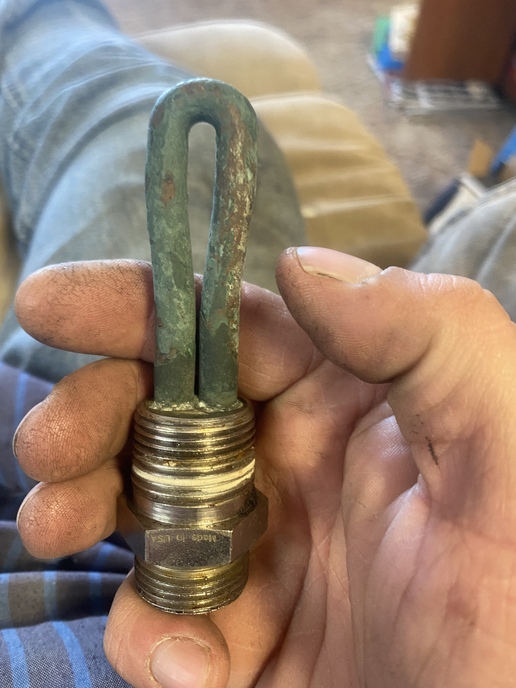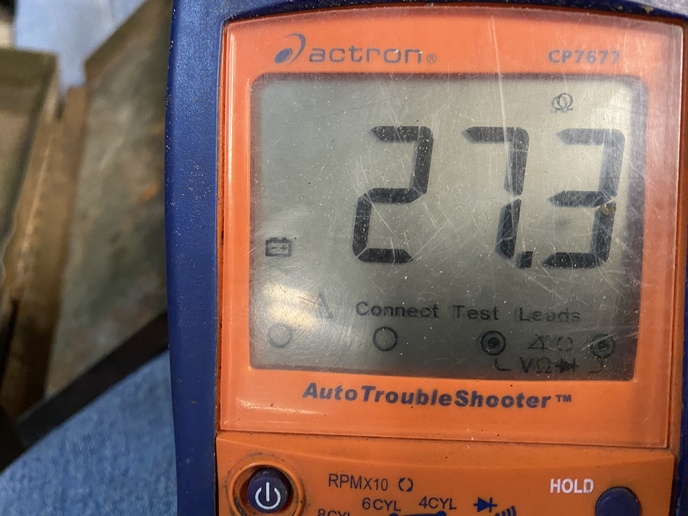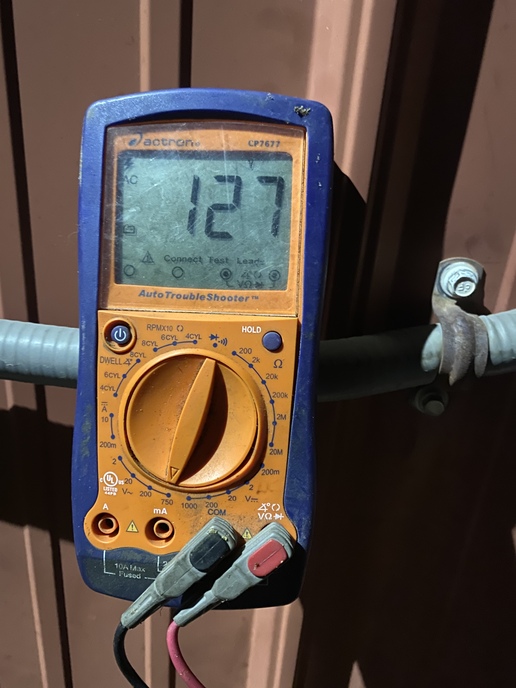You should upgrade or use an alternative browser.
- Thread starter SVcummins
- Start date
sparkiefarmer
Member
MarkB_MI
Well-known Member
- Location
- Motown USA
Consider plugging in a <a href=https://www.harborfreight.com/kill-a-watt-electric-monitor-93519.html>Kill-a-Watt meter</a> between the outlet and heater. It will tell you exactly what the voltage is under load and how much power the block heater is drawing.
With a pure resistive heating element (unlike a motor) type of device I = V/R so if the voltage is low it simply draws LESS current and produces LESS heat, which in theory should NOT harm a heater.
If an intended immersion type of resistive heating element isn't encased in full water/coolant it can overheat and be damaged !!!!!!!!!!!!
Regardless I like to use quality cords even 12 Gauge when using such devices.
John T
Steve@Advance
Well-known Member
Possibly a run of defective heaters.
Most heating appliances have a safety overheat link, a troublesome one time fail device. Common to fail for no reason.
I doubt voltage drop is the cause. Is everything else working ok? Lights burning steady, no flickering or surging?
Russ from MN
Well-known Member
- Location
- Bemidji MN
Jim.ME
Well-known Member
- Location
- central ME
(quoted from post at 10:32:23 02/19/22) I wouldn't think so, low voltage should make them last longer, less power, less heat! Incandescent light bulbs last much longer if the voltage is low.
Likely you aren't but, running an engine with a block heater plugged in can burn the heater out in a short time.
wore out
Well-known Member
(quoted from post at 05:55:23 02/19/22) Ive burned up two in a week only after I started plugging into the barn . Can to low of voltage kill a block heater?
Are there any other relatively "large" loads at the barn or on the wiring that feeds it?
If there are significant loads on the other "leg" AND there's a poor connection in the neutral circuit the voltage on the other "leg" will float UPWARDS with respect to the neutral.
tractors, H&M, and my 7.3L IH PowerStroke that I started hundreds of times with the block heater warming and
at 20+ years old and 300,000 miles still has the factory heating element, but I replaced the cord a couple
times. I gave the truck to my Son, he didn't like the Hassel of plugging/unplugging it, or having instant heat
and defrost after the truck started.
Paul Janke
Member
caterpillar guy
Well-known Member
MarkB_MI
Well-known Member
- Location
- Motown USA
Jim.ME
Well-known Member
- Location
- central ME
They say it is possible for air bubbles to collect/form around the heater when the engine is running. I know some get away with it just fine, but I have seen some that fail where that seems to be the likely cause. I was mechanic for a fleet of concrete mixer trucks at one time. Had three trucks with the same engines and I installed the same block heaters in them. One of the three failed two heaters in a short time. No failures in the other two, even when plugged in the same cord as the one failing heaters. The only difference was it turned out was two unplugged their heaters when checking the oil. The third was unplugging when he was ready to load, so he was running it a half hour or more at times while the truck warmed up. Stopped his doing that and I didn't have to replace that heater again. Just my experience in one case.
Also, too rich an antifreeze mixture can be a problem; straight antifreeze is a no no in all heaters I believe.
BarnyardEngineering
Well-known Member
- Location
- Rochester, NY
MarkB_MI
Well-known Member
- Location
- Motown USA
That's true of induction motors, which want to run at a certain speed and will draw whatever current is necessary to generate sufficient torque to run at that speed. In a low voltage situation, the motor will draw more current than normal, which in turn results in even greater voltage drop. At some point the motor stalls, overheats or trips a breaker.
It's not true, however, of simple resistive loads like heaters. Their behavior is governed by Ohm's Law, which states that as voltage drops, current drops as well.
MarkB_MI
Well-known Member
- Location
- Motown USA
27 ohms would be about right for a 500 watt heater. Is that a known good heater or a suspect one?
MarkB_MI
Well-known Member
- Location
- Motown USA
MarkB_MI
Well-known Member
- Location
- Motown USA
Just because the block heater doesn't warm up sufficiently doesn't mean it's defective. A bad connection can cause a good heater to appear to be bad.
Jim.ME
Well-known Member
- Location
- central ME
found I did some checking hopefully this spare heater I found
is still good ? So the breaker tripped at the barn this time had
to drive my other truck after I found voltage there I came
home plugged the one with the block heater issue and sure
enough I could hear it working right away . So Im still not sure
why the first heater quit working though Just poor quality i
guess
Jim.ME
Well-known Member
- Location
- central ME
(quoted from post at 09:05:11 02/20/22) Im not sure Jim I think 750 watt with my truck meter I finally
found I did some checking hopefully this spare heater I found
is still good ? So the breaker tripped at the barn this time had
to drive my other truck after I found voltage there I came
home plugged the one with the block heater issue and sure
enough I could hear it working right away . So Im still not sure
why the first heater quit working though Just poor quality i
guess
Just like anything, sometimes they just quit.
As for your ohm readings on heaters here are the approximate ohm readings and amp draw values you should see for some of the different wattage 120 volt heaters.
500 watt 28.8 ohms 4.2 amp draw
750 watt 19.2 ohms 6.25 amp draw
1000 watt 14.4 ohms 8.3 amp draw
1500 watt 9.6 ohms 12.5 amp draw
MarkB_MI
Well-known Member
- Location
- Motown USA
Can you dig one of your failed heaters out of the trash and see how many ohms it is? I'd expect it to be open.
You really want to check your voltage under load, since you could have a bad connection someplace that won't show up until you start drawing current. Ideally you want to check the voltage as close to the load as possible. One way would be to insert a <a href=https://www.homedepot.com/p/Leviton-Grounded-Triple-Cube-Outlet-Adapter-White-R54-00692-00W/100356925>cube tap</a> between the outlet and heater cord (or between the extension cord and heater cord), then read the voltage at one of the other outlets on the tap. I think you'll be surprised how much voltage drop you get when the heater is plugged in.
Jim.ME
Well-known Member
- Location
- central ME
(quoted from post at 11:12:57 02/20/22) > This is a spare heater I had I think they are 750 watt . The voltage is at the outlet nothing plugged in
Can you dig one of your failed heaters out of the trash and see how many ohms it is? I'd expect it to be open.
You really want to check your voltage under load, since you could have a bad connection someplace that won't show up until you start drawing current. Ideally you want to check the voltage as close to the load as possible. One way would be to insert a <a href=https://www.homedepot.com/p/Leviton-Grounded-Triple-Cube-Outlet-Adapter-White-R54-00692-00W/100356925>cube tap</a> between the outlet and heater cord (or between the extension cord and heater cord), then read the voltage at one of the other outlets on the tap. I think you'll be surprised how much voltage drop you get when the heater is plugged in.
Multimeter calibration may be off as well.
J.Wondergem
Well-known Member
- Location
- Rockford, Mi.
(quoted from post at 09:14:02 02/19/22) Thats what I thought Ive been running the heater no problem for 6 months at the house on the same size cord its a 14 its the same 14 gauge cord Ive been running my 1500 watt tank heater on for 4 years now . now Im plugging the truck into the barn with a different cord and its burned up two heaters in the truck this week . Ive got a 1500 watt stock tank heater running on 250 feet of 12 gauge and the last 50 feet Is 14 gauge heater is on its second year burned the last one up when I let the water in the trough go low a d exposed the heater element to air
Are you sure you didn't have a air lock? Air will burn it up in a few seconds.
Also, never start the motor while it's plugged in.
This post was edited by J.Wondergem on 02/20/2022 at 07:36 am.
Similar threads
- Replies
- 6
- Views
- 384
We sell tractor parts! We have the parts you need to repair your tractor - the right parts. Our low prices and years of research make us your best choice when you need parts. Shop Online Today.
Copyright © 1997-2024 Yesterday's Tractor Co.
All Rights Reserved. Reproduction of any part of this website, including design and content, without written permission is strictly prohibited. Trade Marks and Trade Names contained and used in this Website are those of others, and are used in this Website in a descriptive sense to refer to the products of others. Use of this Web site constitutes acceptance of our User Agreement and Privacy Policy TRADEMARK DISCLAIMER: Tradenames and Trademarks referred to within Yesterday's Tractor Co. products and within the Yesterday's Tractor Co. websites are the property of their respective trademark holders. None of these trademark holders are affiliated with Yesterday's Tractor Co., our products, or our website nor are we sponsored by them. John Deere and its logos are the registered trademarks of the John Deere Corporation. Agco, Agco Allis, White, Massey Ferguson and their logos are the registered trademarks of AGCO Corporation. Case, Case-IH, Farmall, International Harvester, New Holland and their logos are registered trademarks of CNH Global N.V.
Yesterday's Tractors - Antique Tractor Headquarters
Website Accessibility Policy




